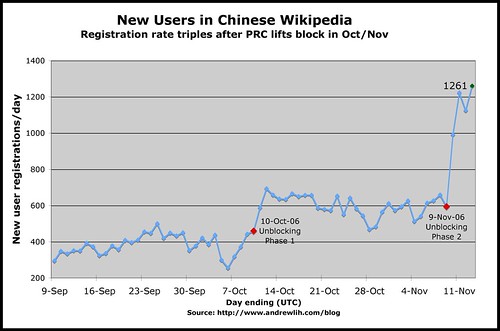I was pleased to learn today (via Jeremy Goldkorn) that China has chosen to unblock WikiPedia. Andrew Lih theorizes the reason for the unblock is that WikiPedia is value neutral, and the Chinese government is glimpsing the constructive power of the read/write web. He writes:
I believe it was because of the argument Jimmy Wales and fellow Chinese Wikipedians have consistently put forth — Wikipedia has a neutral point of view at its core, with no activist or subversive agenda to the site. In the end, I believe consensus among the authorities determined the benefits of Wikipedia far outweigh the risks, and signals their understanding of the beneficial nature of the emerging read-write Web.
This is good news. How many of our school districts block access to WikiPedia? Hopefully not many. Unfortunately, I know many US schools DO block access to Flickr and other read/write web sites. Some districts (my own included) have mandated a wholesale block on all blogs, by decree of the school board. The fact that the Chinese government (an organization generally regarded as even more authoritarian than most US schools) has unblocked it bodes well for many fronts, not the least of which is open access to the world of ideas for the Chinese people.
Participation of the Chinese people in the read/write web should get our attention. Consider this graph of Chinese Flickr users since the site was unblocked in October/November 2006:
Lest we misunderstand and think that perhaps the Chinese government has suddenly realized the great fun people can have with digital photography on sites like Flickr, Andrew Lih points out there is likely a strong economic case for Chinese participation in the read/write web:
The complete argument goes like this: With Wikipedia blocked, China suffers because its ranks of knowledge workers cannot access the top reference site in the world, and the world suffers from not having China’s expertise and input in Wikipedia. Sound familiar? This is a direct example of Wikipedia as the ultimate implementation of what Lawrence Lessig calls “read-write†culture. China wants to read it, the world wants China to write to it.
My main question is, can people in China access ALL the articles in WikiPedia, including the article on “The Tank Man?” Back in April I wrote a post titled “Censored for Relevance,” and included some thoughts on an outstanding PBS Frontline special on “The Tank Man.” It was disturbing to learn at that time that many Chinese university students did not know who the tank man was, and had never heard of him before. Will WikiPedia access in China change this situation? I hope so.
Technorati Tags: china, wikipedia
If you enjoyed this post and found it useful, subscribe to Wes’ free newsletter. Check out Wes’ video tutorial library, “Playing with Media.” Information about more ways to learn with Dr. Wesley Fryer are available on wesfryer.com/after.
On this day..
- Reasons to Invest in Education – 2011
- 3 External Microphone Options for iPads (Nov 2011) – 2011
- Captions and Cross-References for Automatic Page Numbers in MS Word – 2011
- Pennsylvania Newspaper Article / School Tech Director Misrepresents CIPA – 2011
- Ready for the Creativity World Forum #cwf2010 – 2010
- Learning about the amazing iOS Square Credit Card solution – 2010
- Remembering the amazing Grape iMac: 266 mHz with a 6 GB Hard Drive – 2010
- Accessing the web where URL shorteners don’t work? Problem solved with Untiny – 2009
- Branching surveys and self-grading quizzes in Google Forms / Google Docs – 2009
- Ustream chat moderation lessons and Coursecasting opinions – 2008



Comments
4 responses to “China, WikiPedia, Flickr, Web 2.0 and The Tank Man”
Wesley, interestingly this page loaded just fine for me in Beijing. Picture of Tank Man and all.
However, in general those pages related to sensitive articles will still be subject to URL- and page-oriented blocking by keyword. So reading actual text about Tank Man, to accompany the picture, will be harder to do.
wesley,
why read about tank man on wikipedia if you can watch it right here?
http://www.youtube.com/watch?v=igsW5yQ6428
Fast forward to to 5:57 time, proving once again the the Chinese governmen official version of the story has been the most consistent amongst the rest. I translate here in case you don’t understand Chinese:
Democracy Activist said:
(Movie clip time:5:57)
Many people say that at Tiananmen square about 2,000 were shot or perhaps several hundred were
shot. On the square were tanks that crushed people and students etc. etc.
I would like to stress that I did not witness this a bit.I don’t know where the other people witness this.
I was still there until 6:30, and I did not witness this.
I kept thinking: Is it necessary for us to use lies to fight the lies of our enemy?
Are the facts itself not strong enough? (clenches his fist)
If we use lies to attack our enemies that use lies, that will only satisfy our moment of anger.
But this is very dangerous because when your lies are exposed then from then on, you will have no power to defeat your enemy.
Reading from Xi’an, China. I have noticed my WikiPedia access to be generally unimpeeded. On the other hand, as an expat with home internet access, I often find certain parts of sites become blocked after a couple visits (such as a privately run blog site). As far as I can tell this hasn’t been the case for me with WikiPedia.
Today China blocked again WIKIpedia ! as seen on tv… I read also on CNN.com website. You can fight censorship via proxy sites like: http://www.surfinter.net and http://www.hidemyway.com – it is easy and free, anonymous and also hides your IP address. You can also access wikipedia, myspace or other blocked sites from work or school. Also for myspace.com use http://www.msproxy.net ! Enjoy